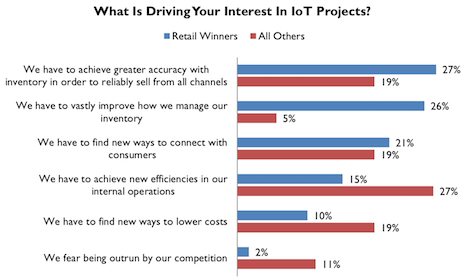 Consumer adoption of “IoT” technologies in the home is accelerating. Image credit: Printemps
Consumer adoption of “IoT” technologies in the home is accelerating. Image credit: Printemps
A growing number of retailers see the power of harnessing the Internet of Things, especially as a way to improve store operations and inventory management.
According to a new report from Retail Systems Research, 69 percent of retailers believe IoT will drastically change the way they do business, up from 53 percent in 2017. The interconnectivity of devices from smartphones and cars to home appliances and more is already having an impact on consumers' everyday lives.
"It’s as though the buzz of 'IoT is coming' translates directly to 'this will save my business in new and magical ways' before the required diligence to understand what these tools can do, or what is required on the part of the business to leverage them effectively," said Steve Rowen, managing partner at RSR and coauthor of the report.
The repot is based on a survey of 116 retailers.
IoT innovations
Technology and ecommerce continue to present retailers with new challenges and opportunities, but the focus should remain on traditional tenants of the business: managing inventory, improving customer relations and making stores more shopper-friendly.
As brands' priorities vary widely, not all companies know how operations will change with more IoT integration. Twenty-seven percent of respondents acknowledge they do not know the operational impact that IoT will have, an increase from 18 percent the previous year.
IoT can be leveraged to manage inventory. Image credit: Nordstrom
IoT adoption and apprehension also varies across industry sectors. Retailers of apparel and hard goods have the clearest idea on the consequences that IoT will have, as at least 80 percent of respondents believe they have some idea of future changes.
RSR took a closer look at how "retail winners" — companies that saw sales growth of more than 4.5 percent — were approaching the topic.
Companies have different IoT project priorities. Image credit: RSR
The top companies are motivated by having more accurate inventory information to serve their multichannel sales, while the companies that saw weaker sales were driven by the opportunity to make internal operations more efficient. Retail winners also prioritized finding new ways to connect with shoppers, while the remainder were more interested in finding ways to cut costs.
While all companies are looking to improve inventory management and stave off competitors to different extents, the common denominator is that the best-performing companies prioritize consumer-focused IoT projects while the rest invest in projects that have a faster internal impact.
Retailers and tech
As is true with IoT, luxury brands should focus on getting the basics of technology right before tackling the flashier digital features.
At a panel hosted by Gartner L2, Astound Commerce, Fluid and CoreMedia, speakers discussed some of the challenges and opportunities facing fashion and beauty brands as they strive to invest in omnichannel retail, from breaking down organizational silos to tackling the changing face of consumer engagement. While brands may have to pick and choose what they can do based on budget, staffing or positioning constraints, the customer should be at the heart of these decisions (see story).
Originally developed to verify transactions using digital currencies, blockchain is now being used for different applications across a number of industries. According to Fashionbi’s “Blockchain in Fashion and Retail Industry” report, large organizations can use blockchain technology to follow the entire product cycle, from production to even product usage.
Although blockchain functions as a decentralized database, permissioned blockchains offer extra security so users can handle supply chain management and other tasks (see story).
"Verification of authenticity, location throughout every stage of the supply chain, visibility for the purposes of meeting customer demand – these are incredibly powerful tools that help solve the problems luxury brands have been so challenged by for so long," RSR's Mr. Rowen said. "Most who have successfully implemented these tools are staying very tight-lipped about it, and understandably so."

